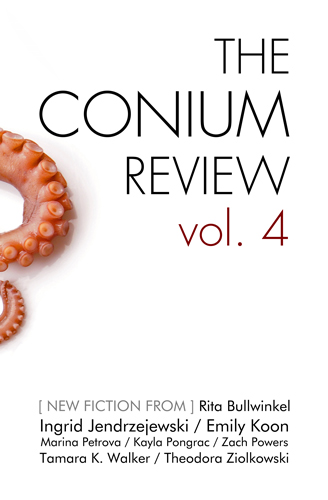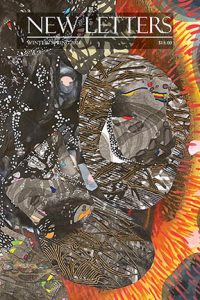The Conium Review – 2015
The design of The Conium Review itself has a simple beauty. The design element of octopus tentacles wrap the outside white cover, and is repeated inside for each story title page. On the flipside of the story title pages, readers see what was on its other side, backwards and fading, as if looking out from inside a shop’s window—inviting readers to enter into the story to look at it from the inside out.
The design of The Conium Review itself has a simple beauty. The design element of octopus tentacles wrap the outside white cover, and is repeated inside for each story title page. On the flipside of the story title pages, readers see what was on its other side, backwards and fading, as if looking out from inside a shop’s window—inviting readers to enter into the story to look at it from the inside out.
The first piece is by the “Innovative Short Fiction Contest” winner Emily Koon, and even from the first page, it’s easy to see why “The People Who Live in the Sears” wins: it does, as the editors hope, “take risks that pay off.” A deeply engrained social commentary, the story uses the plural pronoun to great effect as the mass of people who live in the Sears expands, slowly growing disengaged from the real world, and who greet the newcomers by giving them “the rundown, how easy everything would be now, the blissful few choices left to make.” The perfected social commentary is in the details as suddenly the Sears catches on fire.
My personal favorite in this collection is Marina Petrova’s “Dictator in a Jar,” because “sometimes, when nothing else makes sense, all you want to hear is that the instructions are included.” Beyond the joy of the re-imagined post-break-up story where the main character grows a miniature dictator inside a pickle jar (really, you need to read this), Petrova’s imagery delights with its preciseness. Images such as “the couch stretches and meows like a cat I do not have” and “my boss’s forehead sweat[s] like a block of cheese taken out of the refrigerator” surprise and allow the reader to picture (or hear) the scenario perfectly. Despite the wacky circumstance, readers will very easily connect with the narrator. After all, who of us has not had that moment(s) in life where you just wish someone would take over and tell you what to do?
Similarly, the narrator of Kayla Pongrac’s paragraph-long fiction “Chiroptera” decides to avoid making decisions all together. It starts, “They say that when bats exit caves, they always turn left. If I were a bat, I wouldn’t leave my cave . . . ” I’ll stop there due to how short it is and simply recommend it.
And as Pongrac uses a bat as an overarching metaphor, Ingrid Jendrzejewski uses a shampoo bottle—in such a striking and depressing way that you may think twice next time you take a shower. In it, a man wishes to no longer be his wife’s husband, but rather her bottle of shampoo, to be “scrubbed on somebody’s scalp that evokes an intimacy that is beyond what could ever be achieved in [their] bedroom.” The imagery is strong and is able to carry the entire piece.
The Conium Review boasts a radiant collection of imaginative and intriguing stories that surprise, consume, and enchant the reader—all wrapped up in a neat and simple design that is striking without distracting from the writing.
[www.coniumreview.com]





